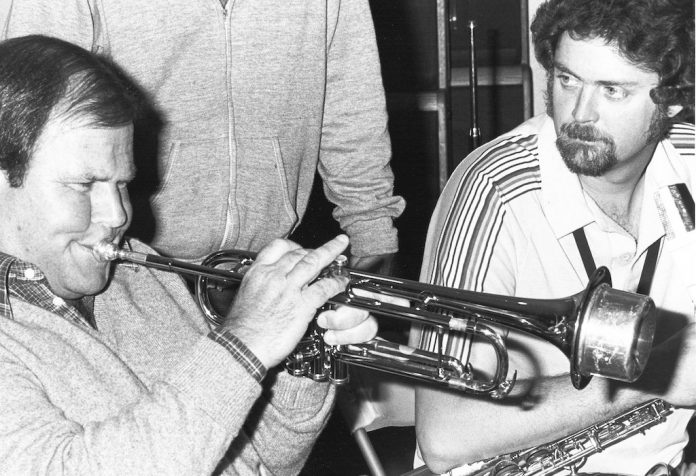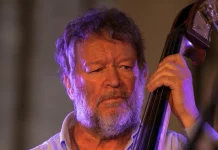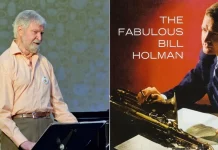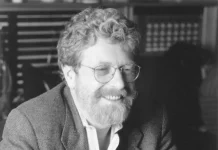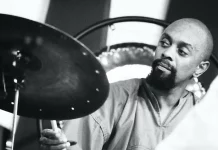Jazz trumpeter Jack Sheldon has died. That he lived such a long life is surprising, given the many often self-induced difficulties he faced and overcame.
He was born Beryl Cyril Sheldon 30 November 1931, Jacksonville, Florida, and while still a child studied trumpet, playing professionally as a young teenager. In the late 1940s he moved to Los Angeles with his mother, Jen Loven, who was a swimming instructor. She ran a swimming school in Hollywood and among her pupils were many film stars. Not surprisingly, Jack was a highly skilled swimmer and assisted his mother at the school.
Music was paramount, though, and he studied with Uan Rasey before military service, during which he played in U.S. Air Force bands. After completing his time with the military he played regularly with many West Coast bands both formally and informally. Among the musicians with whom he worked were Jimmy Giuffre, Dexter Gordon, Wardell Gray, Art Pepper and especially Chet Baker. He and Baker became close friends as he told Steve Lopez of the Los Angeles Times in a 2002 interview. “We’d just go riding all over the place, from Santa Barbara to San Diego, any nightclub we could find, and we’d play for no money. We’d just walk in and say, ‘Can we play?’”
From the mid-1950s through into the 1960s he played and sometimes recorded with Buddy Childers, Curtis Counce, Maynard Ferguson, Herb Geller, Benny Goodman, Wardell Gray, Woody Herman, Stan Kenton, Harold Land, Dave Pell, Art Pepper and Al Porcino. Active in recording studios, he backed many leading artists, including Sammy Davis Jr, Lena Horne, Peggy Lee, Anita O’Day, George Shearing, Frank Sinatra, Mel Tormé and Tom Waits. In addition to recording albums he also appeared on film soundtracks, among them Breakfast At Tiffany’s (1961), Under the Yum Yum Tree (1969), The Long Goodbye (1971), Save The Tiger (1973), The Killing Of A Chinese Bookie (1976), Mommie Dearest (1981), Mr. Saturday Night (1992), Arachnophobia (1990) and For The Boys (1991). Most notable of his film work was his playing of The Shadow of Your Smile on The Sandpiper (1965).
It was, however, his work on television that raised his profile, not only as a fine musician but also as a natural comic and as an actor. As a member of Mort Lindsey’s band he appeared on Merv Griffin’s popular talk show from 1962 to 1978, first in New York and later in Los Angeles. On The Merv Griffin Show, he not only played trumpet in the band but performed comic routines with the host. This led to work as a stand-up comedian (earlier he had worked with Mort Sahl and Lennie Bruce) and also as a comic actor. His acting roles include a few in films, such as in Freaky Friday (1976), and several on television, including sitcoms, The Cara Williams Show and The Girl With Something Extra, and drama, Dragnet and Mike Hammer, Private Eye. While all of these were small parts, he played the lead in the 1966 sitcom, Run, Buddy, Run, which aired for one series of 13 episodes, in which his character, Buddy Overstreet, is an accountant on the run from gangsters. His voice-over work included the children’s educational series Schoolhouse Rock! in the 1970s, a 1996 episode of The Simpsons and in the early 2000s episodes of Family Guy.
Through the 1980s and 1990s he continued to play in jazz groups large and small, including Bill Berry’s LA Band, where his solo spot would include not only superb trumpet playing but also a hilarious comedy routine that varied from night to night as it was customarily rooted in that day’s news. As an example of this, when riots broke out in Los Angeles Sheldon assured his audience that he had done his bit towards calming relationships. “I saw this woman climbing out of a smashed shop window and I told her, ‘Lady, you can’t loot those shoes with that dress’”.
In these decades he recorded extensively, including several albums for Concord Records under his own name and with Ross Tomkins and also for Butterfly Records (and one set, Singular, on Bill Berry’s short-lived Beez Records). In 2005 came the release of a DVD on Kultur, Jack Sheldon In New Orleans, recorded by a small group comprising Frank Capp, Dave Frishberg, John Pisano and Dave Stone. His own groups in later years were chiefly his California Cool Quartet and a 17/18-piece big band. His trumpet playing, which remained at a very high level even as he entered his 80s, was rooted in bop but ably encompassed all of jazz. In another Los Angeles Times interview, in 1987, he said “I like the music to swing, and I like to make people feel it, feel happy and sad, everything. If the music makes me smile and happy, then maybe the people will feel it, too”. This air of happiness is also apparent in his singing, yet another facet of his striking talent. He can rightly be termed s jazz singer and there is often in his throaty delivery an engaging hint of humour. Indeed, humour is full frontal on Yo’ Mama (Don’t Wear No Drawers), his own composition, which became one of his party pieces.
Contrasting with his sunny approach to music, through much of his adult life Sheldon was plagued with problems, including drug addiction and alcohol addiction. He overcame these problems and chose not to hide them. Referring to his addictions, Sheldon once told his audience, truthfully, “I’m with Alcoholics Anonymous and Narcotics Anonymous”. Less truthfully, he continued “I wanted to join Liars Anonymous but the other members kept lying to me about where they were holding the meetings”. He openly discussed his battles with addiction in the 2008 film documentary, Trying To Get Good: The Jazz Odyssey Of Jack Sheldon, in which there are also many examples of his playing and singing. A few years after this film appeared, Sheldon suffered a stroke from which he recovered although thereafter had severely limited use of his right arm.
Jack Sheldon died on 27 December 2019. He is survived by his partner and manager Dianne Jiminez, and his son John and daughter Jesse. He was predeceased by son Kevin and daughter Julie.

